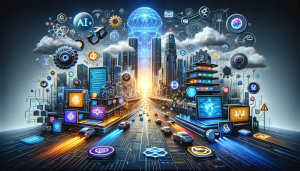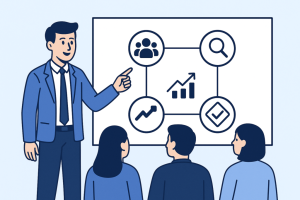AI in Online Marketing 2025 is revolutionizing how brands predict behavior, personalize content, and automate campaigns. Discover 10 powerful strategies driving data-driven success.
-
Introduction: The Intelligent Revolution in Marketing
-
From Intuition to Intelligence – The Evolution of AI in Online Marketing
-
Predictive Campaigns – How AI Forecasts Customer Behavior
-
Automation & Machine Learning – Redefining Marketing Roles
-
Smart Advertising – The New Era of Personalization
-
AI-Powered Branding & Ethical Marketing
-
The Human–AI Alliance – The Future of Digital Marketing
-
Conclusion – Blending Data, Creativity, and Empathy
Introduction: The Intelligent Revolution in Marketing
Online marketing has entered a transformative era — one defined by artificial intelligence (AI), machine learning (ML), and data-driven intelligence. The traditional methods of audience targeting, ad placement, and campaign optimization have evolved into sophisticated, predictive ecosystems.
In 2025, marketing is no longer just about communication — it’s about anticipation. It’s about predicting user behavior, crafting hyper-personalized experiences, and leveraging automation to make data work faster than human intuition ever could.
This transformation is not merely technological; it’s strategic, behavioral, and psychological. The digital marketing landscape is now a living organism — continuously learning, adapting, and optimizing itself through data feedback loops.
Let’s explore how AI, automation, and predictive intelligence are reshaping online marketing — from creative strategy to customer engagement, and from campaign execution to brand storytelling.
1. The Evolution of Online Marketing — From Intuition to Intelligence
The early 2010s were dominated by intuition-driven digital marketing — human creativity fueled by limited analytics. By the 2020s, marketers had embraced big data, yet often found themselves drowning in metrics without meaning.
In 2025, AI has bridged that gap. The role of the marketer has shifted from “data collector” to “data interpreter.”
AI as the New Marketing Brain
Modern AI systems — like Google Marketing Platform AI, Salesforce Einstein, and HubSpot Predictive Insights — go beyond descriptive analytics. They perform prescriptive analysis, suggesting what actions marketers should take next.
They can:
- Predict which audience segment will convert
- Forecast the best time and channel for engagement
- Auto-optimize ad creatives and content performance
Marketing Data Becomes Marketing Intelligence

| Then (2020) | Now (2025) |
| Manual keyword research | Predictive keyword intent analysis |
| A/B testing | Real-time adaptive testing |
| Segmentation by demographics | Dynamic psychographic profiling |
| Post-campaign optimization | Continuous AI-led optimization |
This marks a new age of Marketing Intelligence (MI) — where the synergy between human creativity and machine accuracy defines campaign success.
2. From Traditional to Predictive: The Future of Digital Campaign Strategies
Traditional digital marketing relied on historical data and human judgment. Predictive marketing, powered by AI and ML, foresees future outcomes based on complex data models.
In 2025, marketers use predictive analytics to anticipate customer needs before they’re even expressed.
The Predictive Marketing Framework
- Data Ingestion: Collects behavioral, transactional, and contextual data.
- Pattern Recognition: AI identifies emerging patterns across millions of interactions.
- Predictive Modeling: Algorithms forecast the likelihood of clicks, conversions, or churn.
- Decision Automation: Campaigns automatically adjust bids, content, and creative assets in real time.
Example:
A global fashion retailer leverages AI to predict which products will trend next month — using search data, influencer signals, and social engagement. The marketing team then auto-generates content, email campaigns, and ad visuals before the trend peaks.
Impact of Predictive Strategies
- 40% improvement in conversion rates
- 30–50% reduction in wasted ad spend
- Real-time optimization across channels
Predictive marketing is not about reacting — it’s about proactively designing the customer journey using foresight, not hindsight.
3. How Automation and Machine Learning Are Redefining Online Marketing Roles

AI and automation are redefining what it means to be a marketer. Tasks that once required manual execution — keyword audits, segmentation, reporting, and ad management — are now automated, freeing humans to focus on strategy and creativity.
Automation in Action
- AI Copywriting: Tools like Jasper and ChatGPT produce ad copy optimized for tone, context, and conversion intent.
- AI Bidding Algorithms: Google Ads Smart Bidding adjusts campaigns in real time based on live conversion probability.
- AI-Driven CRM: Platforms like HubSpot and Zoho intelligently route leads and predict deal closure likelihoods.
The New Marketing Roles Emerging in 2025
| Traditional Role | Evolved Role |
| SEO Manager | AI Optimization Specialist |
| Content Marketer | Creative Technologist |
| PPC Analyst | Predictive Campaign Engineer |
| Social Media Manager | Digital Experience Architect |
Human + Machine Collaboration
AI handles precision; humans handle empathy.
Automation enhances productivity, but human creativity remains irreplaceable in storytelling, emotion, and ethical judgment.
Marketers must now master prompt engineering, data interpretation, and AI-assisted creativity — blending analytical and creative intelligence seamlessly.
4. The Rise of Smart Advertising — How AI Personalizes Every Click
Personalization has evolved beyond targeted ads — it’s now predictive, dynamic, and emotional.
AI-driven advertising platforms in 2025 don’t just react to clicks — they anticipate intent. The result is Smart Advertising — campaigns that adapt themselves to each individual user in real time.
Dynamic Creative Optimization (DCO)
AI-powered systems dynamically modify ad visuals, copy, and calls-to-action based on:
- User behavior
- Purchase history
- Emotional sentiment
- Time, location, and even weather
Example:
A streaming platform’s AI detects that a user often listens to upbeat music on Mondays. Its ad engine automatically promotes a “Monday Motivation Playlist” each week — personalized to mood, timing, and location.
The Power of Predictive Personalization
- Boosts click-through rates by +60%
- Reduces ad fatigue and irrelevant impressions
- Strengthens emotional brand connections
Smart Ad Technologies Dominating 2025
- Google Performance Max — omnichannel predictive advertising
- Meta Advantage+ — AI-generated audience and creative insights
- Amazon Marketing Cloud AI — intent-based product placements
Smart advertising is no longer about exposure; it’s about precision and relevance. Every impression becomes an interaction — every click, a conversation.
5. What the Next Generation of Marketers Must Learn About AI-Powered Branding

AI has revolutionized data and distribution — but brand differentiation still depends on emotion, authenticity, and trust.
In the AI era, marketers must learn to use technology as an ally, not a replacement for human creativity.
Key Skills for the Next-Gen Marketer
| Domain | Essential Competency |
| Data Literacy | Understand and interpret AI analytics |
| Creative Adaptability | Use AI tools for storytelling and design |
| Strategic Thinking | Blend automation with human insights |
| Ethical Marketing | Ensure transparency and data integrity |
| Prompt Engineering | Communicate effectively with AI systems |
AI and Brand Authenticity
AI can predict, optimize, and automate — but it cannot feel. The next generation of marketers must balance automation with human storytelling.
Great brands of the future — like Apple, Patagonia, or Canva — use AI not to replace their voice but to amplify their authenticity.
Ethical and Emotional Branding
In a world of deepfakes and algorithmic manipulation, transparency becomes a differentiator.
Consumers value honesty more than perfection.
The marketers who win in 2025 will be those who combine AI precision with ethical creativity — transforming data into empathy, and analytics into art.
Conclusion:
The Human-AI Alliance Defining the Future of Marketing
As we navigate 2025 and beyond, one truth stands firm: AI will not replace marketers — but marketers who master AI will replace those who don’t.
The future of online marketing belongs to adaptive thinkers who understand that the real power of technology lies not in automation, but in augmentation.
AI, data analytics, and automation have revolutionized how we target, measure, and optimize — but human creativity, ethics, and storytelling still define how we connect.
Final Takeaways
- AI = Speed, Humans = Soul — the most successful brands fuse both.
- Predictive intelligence makes campaigns smarter, but emotional intelligence makes them memorable.
- The future marketer is a hybrid professional — fluent in data, automation, and creativity alike.
As online marketing evolves from algorithmic efficiency to emotional resonance, we enter a new golden age — one where technology amplifies humanity rather than replacing it.



